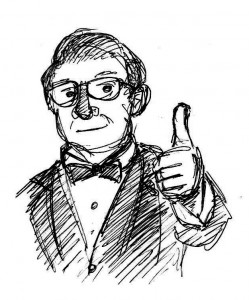It’s safe to say my love of movies began with “two thumbs up.” It was everywhere. It peppered TV spots and movie posters. It floated next to Jim Carey on the DVD case of “Bruce Almighty.” It flashed sleek and shiny beneath Tom Cruise on the poster of “Minority Report” and blazoned greatness in the night with the coming of “Batman Begins.” From the very beginning, I knew the trademarked phrase signified some level of excellence and, using my adolescent deductive abilities, would try to pinpoint the exact quality that made these movies deserving of that special label. In a way, “two thumbs up” was what prompted me to start looking at movies in a critical way.
Before long, I discovered the mind behind the phrase: Roger Ebert, a portly, bespectacled fellow who worked wonders with his words. He is perhaps most well known for his talk show with the late Gene Siskel, but I discovered Ebert through his blog, rogerebert.com, an immense collection of reviews spanning four decades and over 10,000 films. That amounts to over 200 movies per year, a staggering sum that testifies to the man’s devotion and passion for the movies.
But I cared little for statistics. I was drawn in by the sincerity and intelligence of Ebert’s prose, a style that strips away all academic pretenses and simply states what he saw and felt. Every word counts and every sentence feels purposeful. Witty moments abound, matched only by moments of insight. Through it all, Ebert remains level-headed except when faced with films he detests (see his review for Rob Reiner’s “North”).
If anything, though, his famous tirade against Reiner’s flop of a film illustrates Ebert’s utterly intimate take on cinema. In the most remarkable way, his writing evokes movie love at its most personal, a level of emotional truth that is often lost in the translation from heart to paper. Reading his reviews, you know exactly how he felt about a particular movie and why he felt that way, and if the verdict is the full four stars, his writing makes you want to watch the movie immediately, regardless of if you’ve seen it or not.
Consider Ebert’s review of “2001: A Space Odyssey,” part of his “Great Movies” collection and a film that has repeatedly ranked among his all-time favorites. “Only a few films are transcendent, and work upon our minds and imaginations like music or prayer or a vast belittling landscape,” Ebert wrote. This one sentence conveys the effect Kubrick’s film had on him, and we sense exactly what he meant. And though the line is short, it’s powerfully evocative — if a movie can produce that effect in a person, it’s probably worth checking out.
In these instances of cinematic rapture, Ebert became less a figure of purported intellectual authority than a witness to a miracle, eager to share his joy. Where most critics seek to assert their analytical prowess, Ebert deliberately sat in the audience with us. His reviews feel like a conversation between him and the reader, side by side among the plush, stadium seats of a movie theater (or even better, a movie palace.) He is assured but never condescending. He will admit when he doesn’t know something, a move that is often seen as a sign of weakness in the field of criticism. With Ebert, it shows both humility and strength of character.
But Ebert was not audience only to the movies. He was, as written in his review of 2012’s “Amour,” a “member of humankind’s eternal audience,” and one of the most vocal ones at that. Through all his reviews and blog posts runs one unifying thread: a compassion for humanity and a joy for life. He was moved by the universal sadness of “Tokyo Story.” His heart broke for Jake LaMotta’s searing, emotional wounds in “Raging Bull,” but it soared in response to the films of Rahman Bahrani, which capture the vibrant textures of America’s unsung lives in intimate detail. His favorite film of the last decade was “Synecdoche, New York,” which, according to Ebert, is about “nothing less than human life and how it works.”
Another, perhaps even better reference point for human living is Ebert himself. Born June 18, 1942 in Urbana, Ill., Ebert began his journalism career when he was just 15 years old, covering Urbana High School sports for the News Gazette. In 1961, he published one of his first reviews, writing about “La Dolce Vita,” a film that he will treasure for the rest of his life. In 1967, he officially became a film critic for the Chicago Sun-Times, where he proceeded to influence an entire generation of moviegoers and reviewers, becoming the first critic ever to win the Pulitzer Prize. He even tried his hand at screenwriting — Ebert’s pride was “Beyond the Valley of the Dolls,” a schlock melodrama which he co-wrote with director Russ Meyer.
In 1982, Ebert began his famous partnership with Gene Siskel, together trademarking the “thumbs up/thumbs down” style of reviewing. Ten years later, he married Charlie “Chaz” Hammelsmith, who would become a major source of strength for him after he was diagnosed with cancer in 2002. He grappled with the disease for over 10 years, doggedly continuing to review films almost the entire time. When he died last Thursday, April 4, it marked the end of a battle well-fought and a life well-lived. Ebert had become a hero and mentor for us all, inspiring us with his writing, wisdom, and unwavering strength in suffering.
Rest in peace Roger Ebert, and as you wrote in your final blog post, “I will see you at the movies.”
Jeng is a member of the class of 2016.


